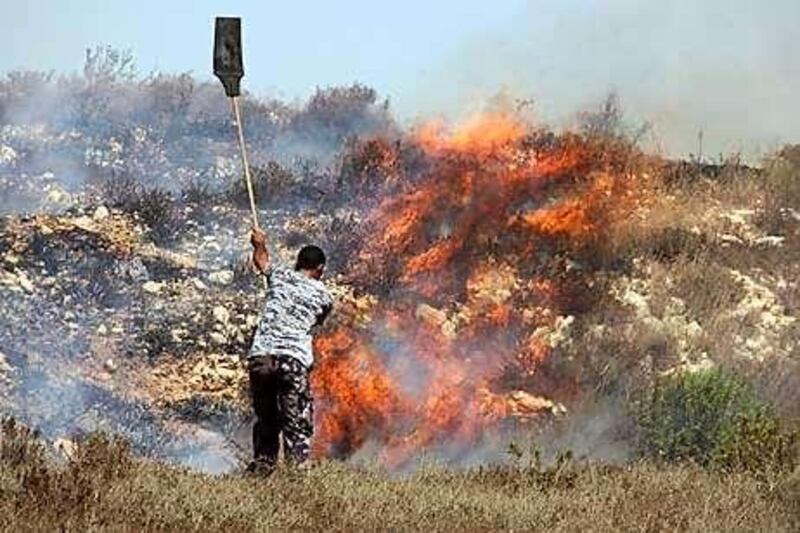NAZARETH // A rabbi from one of the most violent settlements in the West Bank has been questioned on incitement charges as Israeli police stepped up their investigations into a book in which he sanctions the killing of non-Jews, including children and babies.
Rabbi Yitzhak Shapira is one of the leading ideologues of the extreme wing of the religious settler movement. He is known to be a long-standing champion of the "price-tag" policy of reprisal attacks on Palestinians, including punishing them for attempts by officials to enforce Israeli law against the settlements. So far the policy has chiefly involved violent harassment of the inhabitants of villages neighbouring Rabbi Shapira's settlement in Yitzhar, with settlers beating Palestinians, attacking their homes, throwing stones, burning fields, killing livestock and poisoning wells.
It is feared, however, that Rabbi Shapira's book The King's Torah, published last year, is intended to offer ideological justifications for widening the scope of such attacks to include killing Palestinians, even children. Although Rabbi Shapira was released a few hours after his questioning on Monday, dozens of rabbis, as well as several members of parliament, rallied to his side, condemning the arrest.
Shlomo Aviner, one of the settlers' spiritual leaders, defended the book's arguments as a "legitimate stance" and one that should be taught in Jewish seminaries. But in a sign of mounting official unease at Rabbi Shapira's influence on the settlement movement, the Israeli military authorities also threatened last week to enforce a decade-old demolition order on Yitzhar's seminary, which was built without a permit.
Dror Etkes, a Tel Aviv-based expert on the settlements, said the order was unlikely to be carried out but was a way to pressure Yitzhar's over 5,000 inhabitants to rein in their more violent attacks. He said the authorities had begun taking a harder line against Yitzhar only since Rabbi Shapira and several of his students were suspected of torching a mosque in the neighbouring village of Yasuf last December.
"Shapira is trying to redefine the conflict with the Palestinians, turning it from a national conflict into a religious one. That frightens Israel. It doesn't want to look as though it is fighting the whole Islamic world," Mr Etkes said. He added that Rabbi Shapira and his supporters were closely associated with Kach, a movement founded by the late Rabbi Meir Kahane that demands the expulsion of all Palestinians from a "Greater Israel". Despite Kach being banned, officials have largely turned a blind eye as its ideology has flourished in the settlements.
"It may be illegal to call oneself Kach but the authorities are more than tolerant of settlers who hold such views and carry out violent attacks. In fact, what Kahane was doing in the 1980s seems like child's play compared with today's settlers." In the 230-page book, Rabbi Shapira and his co-author, Rabbi Yosef Elitzur, also from Yitzhar, argue that Jewish law permits the killing of non-Jews in a wide variety of circumstances. The terms "gentiles" and "non-Jews" in the book are widely understood as references to Palestinians.
They write that Jews have the right to kill gentiles in any situation in which "a non-Jew's presence endangers Jewish lives" even if the gentile is "not at all guilty for the situation that has been created". The book sanctions the killing of non-Jewish children and babies: "There is justification for killing babies if it is clear that they will grow up to harm us, and in such a situation they may be harmed deliberately, and not only during combat with adults."
The authors also advocate committing "cruel deeds to create the proper balance of terror" and treating all members of an "enemy nation" as targets for retaliation, even if they are not directly participating in hostile activities. The rabbis appear to be offering justifications in Jewish law for collective punishment and other war crimes of the kind committed by the Israeli army in its attack on Gaza in the winter of 2008. Pamphlets similarly calling on soldiers to "show no mercy" were distributed by the army's rabbinate as troops prepared for the Gaza operation, in which 1,400 Palestinians, the majority of them civilians, were killed. Religious settlers have come to dominate many combat units.
Complicating the issue, an investigation last year by Yesh Din, an Israeli human rights group, found Rabbi Shapira's seminary had received government funds worth US$300,000 (Dh1.1million) in recent years. According to the Jerusalem Post newspaper, the Yitzhar settlers have responded to the demolition order against their seminary by threatening to publish documents showing that the housing and transport ministries were closely involved in the project. The settlers have repeatedly rampaged through nearby Palestinian villages, most notoriously in September 2008, when they were filmed shooting at homes in Assira al Kabaliya.
A settler from Yitzhar was questioned last month over the fatal shooting of a Palestinian, Aysar Zaban, 16, in May, reportedly after stones were thrown at the settler's car. Yitzhak Ginsburg, an authority on Jewish law and a mentor to Rabbi Shapira, was questioned by police on Thursday over his endorsement of the book. In the past Rabbi Ginsburg has praised Baruch Goldstein, a settler who opened fire in Hebron's Ibrahimi mosque in 1994, killing 29 Palestinian worshippers.
@Email:foreign.desk@thenational.ae






